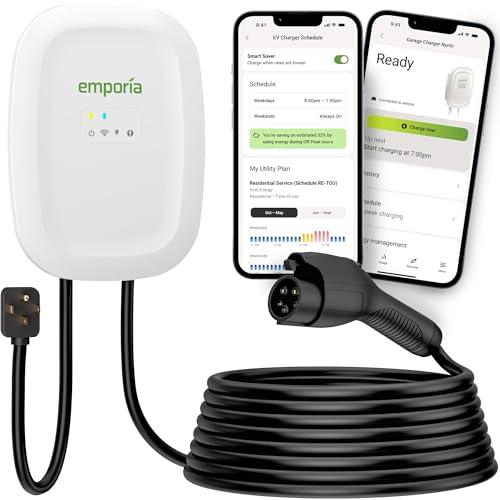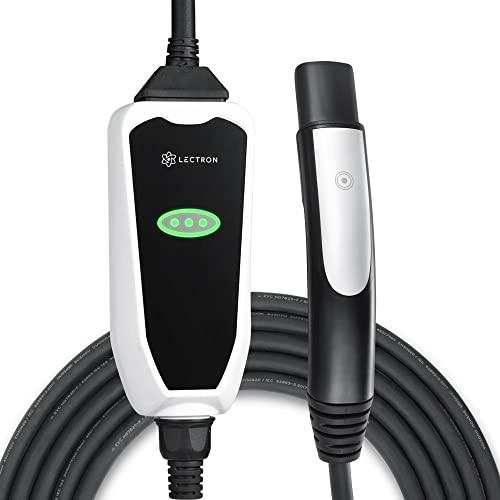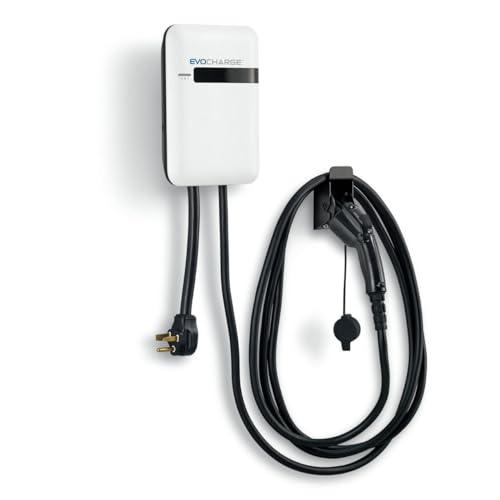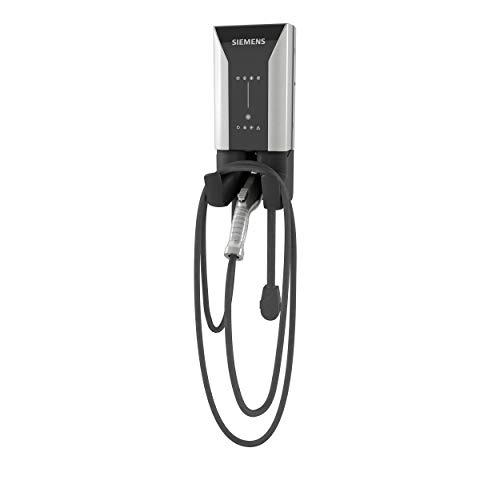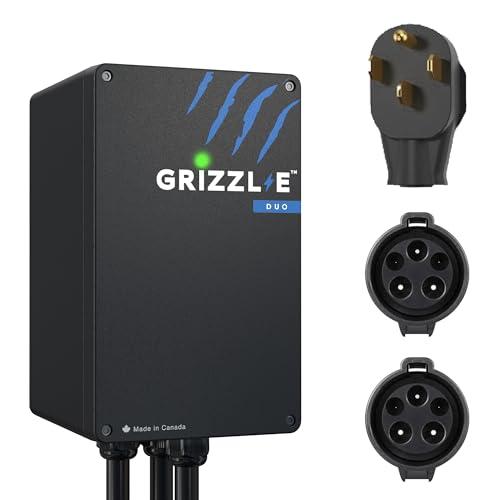Time
How long does it take to charge an electric car?
We'll show you a little formula so you know how long it takes to charge your electric car depending on two factors.
There is no one type or time to charge an electric car. There are three speeds (or levels) that are differentiated:
Slow charging (Level 1): when it takes 5 to 8 hours to charge
- Semi-quick charging (Level 2): when it takes an average of 1.5 to 3 hours to charge.
- DC Fast Charging (Level 3): the car charges in about 15 minutes or less. Sometimes a different connector is used for this.
We must also keep in mind that vehicles have different charging modes, one faster (DC) and one slower (AC).
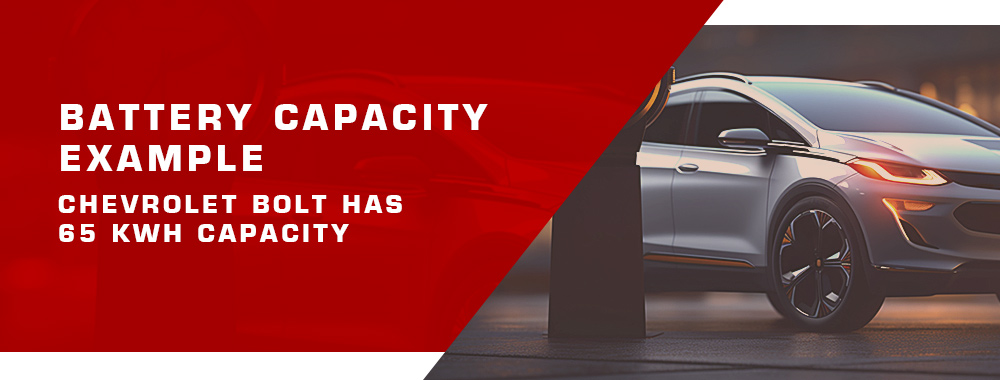
General table for the fastest charging times for EVs based on the charging level
| Charging Level | Charging Time (hours) | Power (kW) | Current (Amps) | Voltage (Volts) | AC/DC | Note |
|---|---|---|---|---|---|---|
| Level 1 | 8-20 | ~1.4 | 12-16 | 120 | AC | Standard household outlet in the U.S. |
| Level 2 | 3-8 | 3.3-19.2 | 16-80 | 240 | AC | Common for home and public charging |
| Level 3 (DC fast charger) | 0.5-1 | 50-350 | Varies | 400-800 | DC | Used for rapid charging on long trips |
Please note that these are approximate values, and actual charging times can vary based on the specific vehicle, battery capacity, state of charge, and other factors. Use our calculator to calculate your charging duration more accurately.
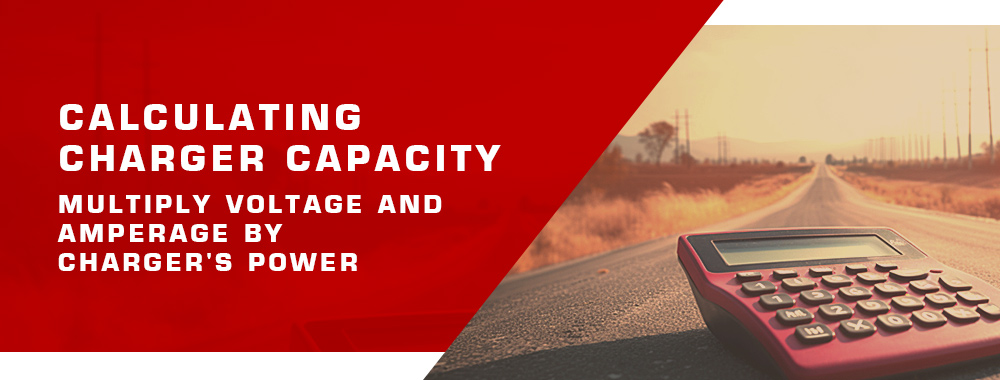
Level 1
This is the slowest form of charging, typically using a standard household outlet. It's best suited for plug-in hybrid electric vehicles (PHEVs) or overnight charging of all-electric vehicles (EVs).
Level 2
This is the most common form of EV charging and can be found in homes, workplaces, and public charging stations. It uses a 240V system (similar to a home dryer or oven) and can fully charge an EV in several hours.
Level 3 (DC fast charger)
These are high-powered chargers that can recharge an EV to 80% in around 30 minutes to an hour. They're typically found along highways or in locations where quick charging is essential. The exact power (kW) can vary widely, with newer chargers offering up to 350 kW or more.
Remember, the actual charging time for an EV depends on the battery's capacity and its current state of charge. The values provided are general estimates.
Level 2 chargers deliver 25 miles (40 kilometers) of range
If you want to know how to calculate the charging time for your EV, you should know that a typical EV battery requires about an hour of power to reach its maximum capacity. However, if you want to know how long it will take your EV to charge to full capacity, there are several factors to consider. You should also know that EVs vary in the size and power of their batteries, so the exact charging time will depend on the model and battery size.
Charging times for electric cars vary, depending on the size of the battery, the charging method, the battery level, and the type of charger you use. The best way to figure out the charging time for your EV is to make a rough estimate on the EV's battery level and the type of charger you'll be using. If your battery is low or full, your charging time will be half of the expected total time. The reason for this is a built-in feature in EVs to extend battery life and avoid overcharging.
💡 Did you know? The US Department of Transportation unveiled new national standards for federally funded EV chargers in February 2023. These standards ensure that charging is a predictable and reliable experience for EV drivers, including easy charger location, consistent price communication, and future compatibility.
Estimated Electric Range per Hour of Charging
One of the most crucial aspects to consider when charging an EV is the range added per hour of charging. Here's a breakdown based on the charger type:
- Level 1: 2 - 5 miles
- Level 2: 10 - 20 miles
- DCFC: 180 - 240 miles

How to calculate EV charge time?
Steps to Determine EV Charge Time
Vehicle Selection: Different vehicles have varied battery sizes. Knowing your vehicle's battery size is essential. For instance, a Tesla Model 3 comes with an 80 kWh battery.
- Determine the Charge Needed: Subtract the current charge level from your desired target charge level. This gives you the amount of energy required. So, if your Tesla Model 3 with an 80 kWh battery is at 20% and you wish to charge it to 80%, the calculation would be 80% - 20% = 60% of charge needed. This translates to 80 kWh x 0.6 = 48 kWh required.
- Charger Power Output: This relates to the amount of power a charger can provide. For example, a Level 2 charging station may offer 7.68 kW.
- Calculate Charging Time: Divide the charge needed (in kWh) by the charger power output (in kW). Using our example, the formula would be: 48 kWh / 7.68 kW = 6.25 hours.
💡 Use Charging Calculator
Our online tool can help you determine the estimated charging time, considering all variables. The calculator often factors in the type of vehicle, current charge level, desired charge level, and charger power output.
Simplified formula for calculating your electric car's charging rate:
Duration = Battery capacity (kWh) x 1000 / EVSE power (kW) x 1000
Or, for example, a car with a 65 kWh battery using a 6.5 kW charger would take this time to charge:
Duration = 65000/6500 = 10 hours.
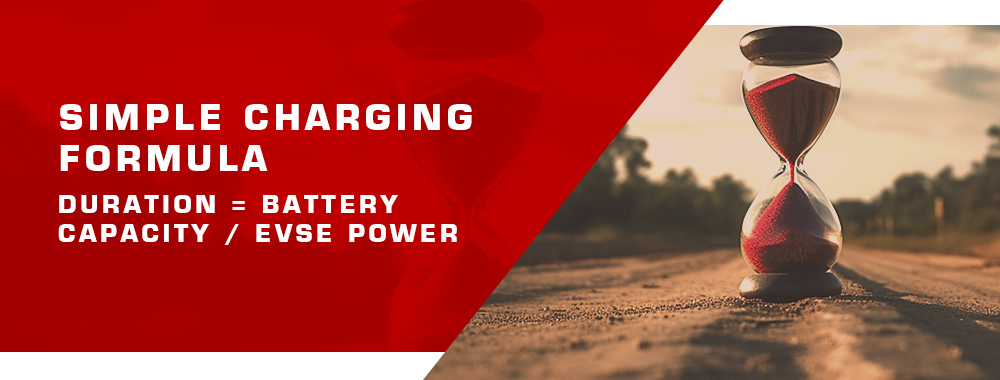
Of course, a very rough calculation is shown. The Electric Vehicle Calculator, however, takes into account the 10% loss, and the individual limitations of the electric car's built-in charging unit.
The most common way to charge an electric car is using a home charging station (wall connector) in a private garage with a NEMA 14-50 socket. Depending on the charger and different manufacturers, you can also get faster (Level 2) or slower charging (Level 1). If you choose one of the best charging stations, it will negotiate the maximum allowable power with the car without your involvement.
The fastest charging, on the other hand, is available at constant current charging station networks. Tesla has its connector but can use j1772 on the networks with an adapter.
If you want to buy and install a charger for your electric car in your home, office, you can check out recommendations for the best product from professional electricians.
How does the calculator calculate how long to charge an electric vehicle?
The charging time for an electric car depends on different variables.
The first thing you need to know is battery capacity. How do you find out the battery capacity of an electric car? Here in the calculator, by selecting the model you will immediately see information about the battery. You can check this information in the datasheet of your car. This data is presented in kWh (kilowatts per hour). For example, a car like the Chevrolet Bolt has a battery capacity of 65 kWh. If you want to know the characteristics and types of batteries that exist, experiment with selecting electric car models in the calculator.
Another piece of information we need to know is the battery charger capacity (EVSE) or charging intensity. This information is calculated by multiplying the voltage (in the U.S. it is 120 V or 240 V) by the charger's power, measured in amps. Generally, with electric chargers, you can already see the degree of power covered in kW, so you only need to multiply the battery capacity and power by 1000. The good news is that a calculator will do it for you here.
How Do I Calculate the Charging Time for an EV?
When calculating the charging time of an EV, there are several factors to consider. The optimal charging time for an EV is based on battery capacity, onboard charger power rating, and charging losses. Assuming that a power source is capable of maximizing chargers, this can be estimated in about 30 minutes. Then, the remaining charging time is based on those factors.
EV charging duration depends on a number of factors
The charging time of an EV can be as short as 20 minutes or as long as 12 hours, depending on various factors, including the battery pack size and state of charge. You may be wondering why the charging time of an EV is so different. Well, let's look at some of these factors and find out how they affect charging time. The best way to calculate the charging time of an EV is to compare its battery capacity to the charge time of a typical vehicle.
The charging time of an EV depends on several factors, including the size of the battery and the power of the charging station. However, fast EV charging is the most preferred method right now, with charging stations capable of 11kW to 22kW. As EV technology continues to improve, it is still unclear what factors affect the charging time of an EV. The time it takes to fully recharge an EV depends on many factors, including its speed of charging, the type of charger used, the location of the charging station, and a number of other variables.
How Does Battery Size and Charging Speed Influence Vehicle Performance?
The size of an EV battery is intrinsically linked to the vehicle's driving range. Essentially, a more substantial battery has the capability to store a greater amount of energy, enabling the vehicle to cover extended distances before necessitating a recharge. However, the time it takes to recharge, often termed as the charging time or recharge time, is governed by the vehicle's maximum charging rate. This rate, sometimes referred to as the charging power or charging speed, dictates the average time to charge the battery. While a higher charging rate ensures quicker charging times, it's imperative to ascertain that the battery can endure such speeds without compromising its longevity.

What Insights Can You Gather About Battery Condition?
The condition of a battery is paramount for achieving peak performance. Batteries, over their lifespan, can experience degradation, diminishing their charge retention capacity. Overcharging, excessive discharging, and physical impairments can negatively impact the battery's condition. Implementing regular check-ups and maintenance routines can aid in extending the battery's operational life.
How Do External Factors Like Age and Temperature Impact a Battery?
As batteries age, there's an inevitable decline in their efficiency. This means that as they get older, batteries may not deliver the same range or output as they did when brand new. Furthermore, temperature fluctuations play a pivotal role in battery performance. Extreme cold or heat can hinder the battery's functionality and longevity. To combat this, many contemporary EVs are equipped with thermal management systems, ensuring the battery operates within optimal temperature ranges.
Why is the State of Charge (SoC) a Vital Metric?
The State of Charge (SoC) provides a percentage representation of the current battery level. For drivers, this metric is essential as it offers insights into the remaining charge and indicates when the next recharge session might be due. For optimal battery health, it's recommended to keep the SoC between 20% and 80%.
Defining Optimal Battery Range
The optimal battery range denotes the maximum distance an EV can traverse on a full charge under typical conditions. However, this range isn't constant and can be influenced by driving patterns, the nature of the terrain, and external conditions such as weather.
How Can You Ascertain Battery Status?
Battery status offers a glimpse into the battery's health and operational efficiency. Modern EVs are integrated with advanced diagnostic tools that provide real-time data on battery condition, SoC, and potential anomalies.
Deciphering the Role of Onboard Chargers in EVs
Onboard chargers serve the crucial function of converting grid AC power to DC power, facilitating battery charging. The efficiency or capacity of the onboard charger, quantified in kW, determines the speed at which the battery can be recharged from conventional electrical sources.
Unraveling the Benefits of Battery Preconditioning
Battery preconditioning is a technique wherein the battery is conditioned to an ideal temperature before initiating the charging process or embarking on a drive. This procedure ensures the battery operates at peak efficiency, especially under extreme climatic conditions, ultimately bolstering battery life and enhancing overall vehicular efficiency.
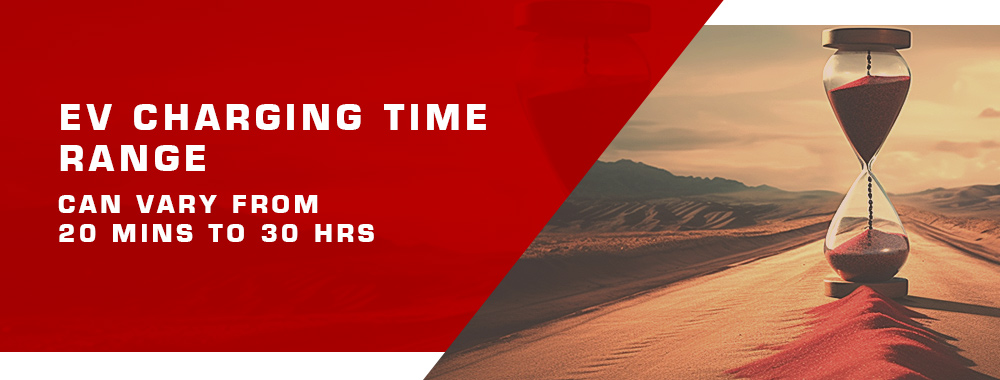
Equipment Factors: Adapters and Extension cords
Using adapters like NACS-to-J1772 or NACS-to-CCS1 can slow down how quickly your electric vehicle charges and make you wait longer. Sometimes, the charger or onboard charger can figure out these adapters on its own. But other times, you need to read the label on the device and set the limits yourself. Even though things like adapters and EV extension cords you add might change how fast your electric vehicle charges, the main things that decide the charging speed are the EVSE (Electric Vehicle Supply Equipment) and the onboard charger that's built into your electric vehicle.
Additional Factors to Consider
Socket Output
Different sockets provide different power outputs. A domestic socket may offer less power compared to a dedicated EV charging socket, leading to longer charging times.
Power Source for Charging
Renewable energy sources, like solar or wind, can influence the charging speed and the environmental impact of your charge.
Top-Up Charging
Instead of waiting for the battery to deplete completely, many EV users prefer topping up their charge periodically. This reduces the total charging time and ensures the vehicle is always ready for longer trips.
Smart EV Charging
Modern EV chargers can be scheduled to charge during off-peak hours, saving costs and optimizing energy usage.
Public Charging Infrastructure
The availability and distribution of public charging stations can influence your charging strategy. It's always handy to know their locations and the kind of output they offer.
Other Variables
Factors like battery age, temperature, and type of charger (fast charger, supercharger, etc.) can also affect the final charging time.
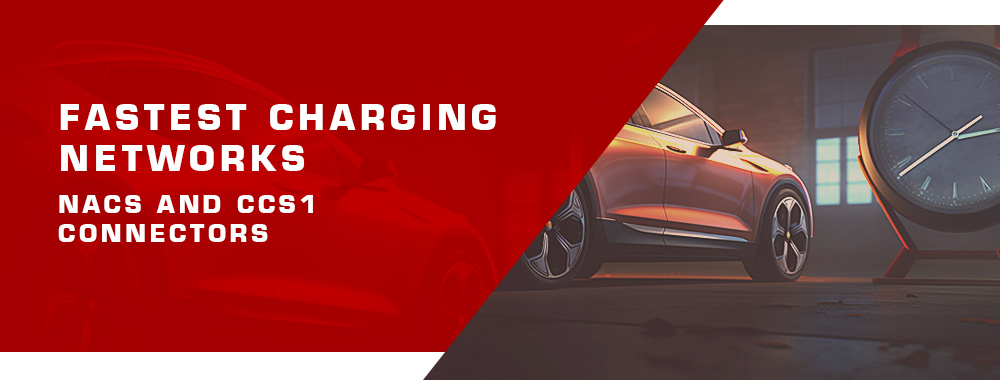
Socket Output and Waiting Time
| NEMA Connector | Description | Voltage | Amps | Speed/Power |
|---|---|---|---|---|
| NEMA 14-50 | Commonly used for charging electric vehicles. | 240V | 40A | Can recharge a modern EV battery in fewer than 8 hours. |
| NEMA 6-50 | Used for higher-power appliances and for charging electric vehicles like Tesla. | 240V | 40A | One of the fastest domestic chargers, providing up to 9.6kWh or 30-35 miles of range in just one hour. |
| NEMA 14-30 | Used in non-locking settings such as in dryers. | 240V | 24A | - |
| NEMA L5 | Two-pole connectors with grounding, suitable for RV charging. | 120V | - | Voltage rating of 120 volts. |
| NEMA 5-15 | Basic wall outlet, standard for Level 1 chargers. | 120V | 12A | Provides 2-3 kilowatts of power per hour. |
| NEMA 6-20 | Another standard level 1 charger introduced for early EVs. | 240V | 16A | Provides 2-3 kilowatts of power per hour. |
| NEMA TT-30 | Commonly known as the RV 30, used for recreational vehicles. | - | 24A | Compatible with both the NEMA 5-15R and 5-20R receptacles. |
| NEMA 10-30 & 10-50 | Not recommended for EV charging due to lack of grounding wire. | - | 24A & 40A | - |
Fuel to Electric: How Fast Can Gas Generators Charge Your EV?
At EV Adept, specialists in EVSE installations, we've detailed in our special guide on charging electric vehicles (EV) from gas generators. It's essential to know that while charging an EV with a portable generator is feasible, compatibility is paramount since not all generators align with every EV's onboard charger. Most EVs demand a generator producing at least 5kW. Also, charging times using these generators can be notably longer compared to dedicated EV stations. Safety is crucial: incorrect connections might harm the EV's battery or other components. Therefore, always refer to the manufacturer's guidelines or professional advice before employing such a method.

Empty-to-full time
The time taken to charge an EV from completely empty to full depends on the charger type and the vehicle's battery capacity. However, it's essential to note that charging speed slows as the battery gets closer to full to prevent battery damage. Hence, it's more cost- and time-efficient for EV drivers to use DC fast charging until the battery reaches 80% and then continue their trip.
💡 Good to Know: Charging speed is affected by various factors, including the charger manufacturer, condition, age, air temperature, vehicle battery capacity, and the vehicle's age and condition.
The Speediest Charging Electric Vehicle
Based on EV Adept research, the Lucid Air holds the title for the quickest charging EV in the US for 2023, boasting a 900V+ system and a 350-kilowatt charger. This allows the Air's battery to charge from 20% to 80% in a mere 15 minutes. Competing in the fast-charging arena in 2023 are vehicles like the Kia EV6, offering up to 14.5 miles of range in a minute, and the GMC Hummer EV pickup with a maximum charge rate of 350 kW. Yet, the Lucid Air stands out with its unparalleled charging capability.
Minimizing Electric Car Charging Wait Times:
- Precondition the Battery: This can optimize charge times. By setting the charger as a navigation destination, some cars automatically adjust the battery temperature to enable faster charging.
- Limit EV Quick Charging: If your battery is closer to empty, it'll charge faster. Maximize distance between fast-charging stops. Additionally, preconditioning before each stop not only saves time but also money at public charging stations.
- Share Your Route in Advance: By doing so, computer models can predict and reduce charging queues, potentially slashing wait times by up to 97%.
- Plan Charger Stops Ahead of Time: When traveling, locate fast chargers, especially near places you'll be visiting. Aim to find a DC fast charger – it can bring your battery to 80% in typically less than an hour.
- Use Slower Charging for Battery Health: If you don’t frequently use your EV or are preparing for a long trip, opt for a timed and slower charger. This method is gentler on the battery when compared to frequent fast charging.
Following these guidelines helps EV Adept customers successfully optimize the charging process and extend battery health.
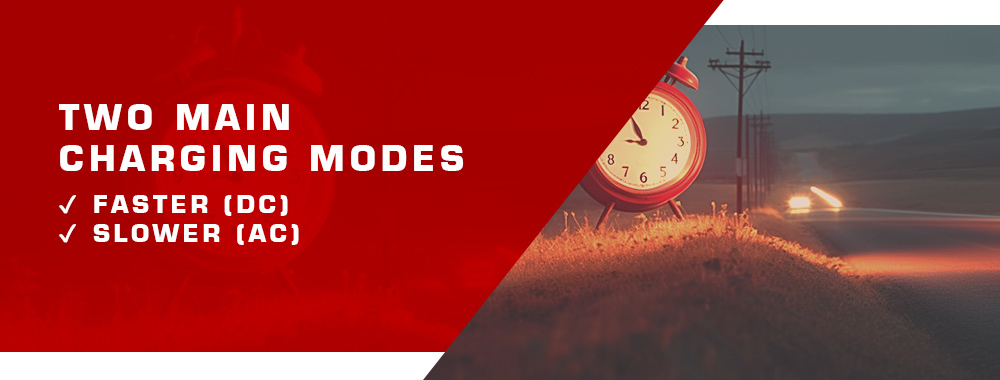
What is the charging time for popular electric car models
| Tesla Model 3 | Chevy Bolt | Nissan Leaf | |
|---|---|---|---|
| 40 Amp EV charger | 4 h 52 min | 6 h 53 min | 4 h 33 min |
| 32 Amp EV charger | 4 h 52 min | 6 h 53 min | 4 h 33 min |
| 16 Amp EV charger | 9 h 52 min | 13 h 02 min | 7 h 54 min |
Many other models can be found on this calculator page.
We hope the EV Charging Time Calculator came in handy for calculating your electric car's recharge time.
With the current tool, you now know how to charge your electric car faster and better, depending on the type of EVSE.
References:
- US Department of Transportation - Charger Types and Speeds
- Car and Driver - How Fast the Latest EVs Can Charge
- MakeUseOf - Electric Car Charging Speeds Explained
- The California government's DriveClean
- The White House website
- The Alternative Fuels Data Center
Factors Affecting Electric Vehicle Charging Time
| Factor | Impact on Charging Time |
|---|---|
| Battery Size | Larger batteries will typically take longer to charge than smaller ones, as they require more energy to fill up. |
| Charging Speed | EVs can charge at different speeds depending on the type of charging station used. For example, a Level 1 charging station may take several hours to charge an EV, while a Level 3 DC fast charger can charge an EV up to 80% in as little as 30 minutes. |
| State of Charge | The time it takes to charge an EV will depend on the current state of charge (SoC) of the battery. A battery with a low SoC will generally take less time to charge than one with a high SoC. |
| Temperature | Battery temperature can impact charging time, as colder temperatures can reduce the efficiency of the charging process. |
| Charging Infrastructure | The availability and accessibility of charging infrastructure can impact charging time, as it may take longer to find a charging station and wait for a free charging spot. |
| Vehicle Make and Model | Different makes and models of EVs may have different charging capacities, which can impact charging time. Additionally, some EVs may be compatible with certain types of charging stations, which can also impact charging time. |
| Power Supply | The capacity of the power supply and the amount of electricity available can impact charging time, as a lower capacity power supply may take longer to charge an EV. |
Facts about EV Range
- Electric vehicle (EV) owners can play a thrilling game of "Range Roulette" - taking bets on how far they can go before their battery gives out. Winner gets a free tow!
- EV range anxiety has led to a new profession: the "Range Therapist." They specialize in helping EV owners cope with the fear of being stranded by a depleted battery.
- Tesla's latest EV upgrade includes a "Hitchhiker Mode" that calculates the probability of finding a friendly passerby to give you a lift when you run out of range.
- EV range extender manufacturers have been trying to partner with coffee shops, claiming that their product pairs perfectly with a cup of java: "Recharge your car and yourself!"
- EV owners have started a viral trend called the "Battery Dance," performed every time their EV range magically increases after driving downhill.
